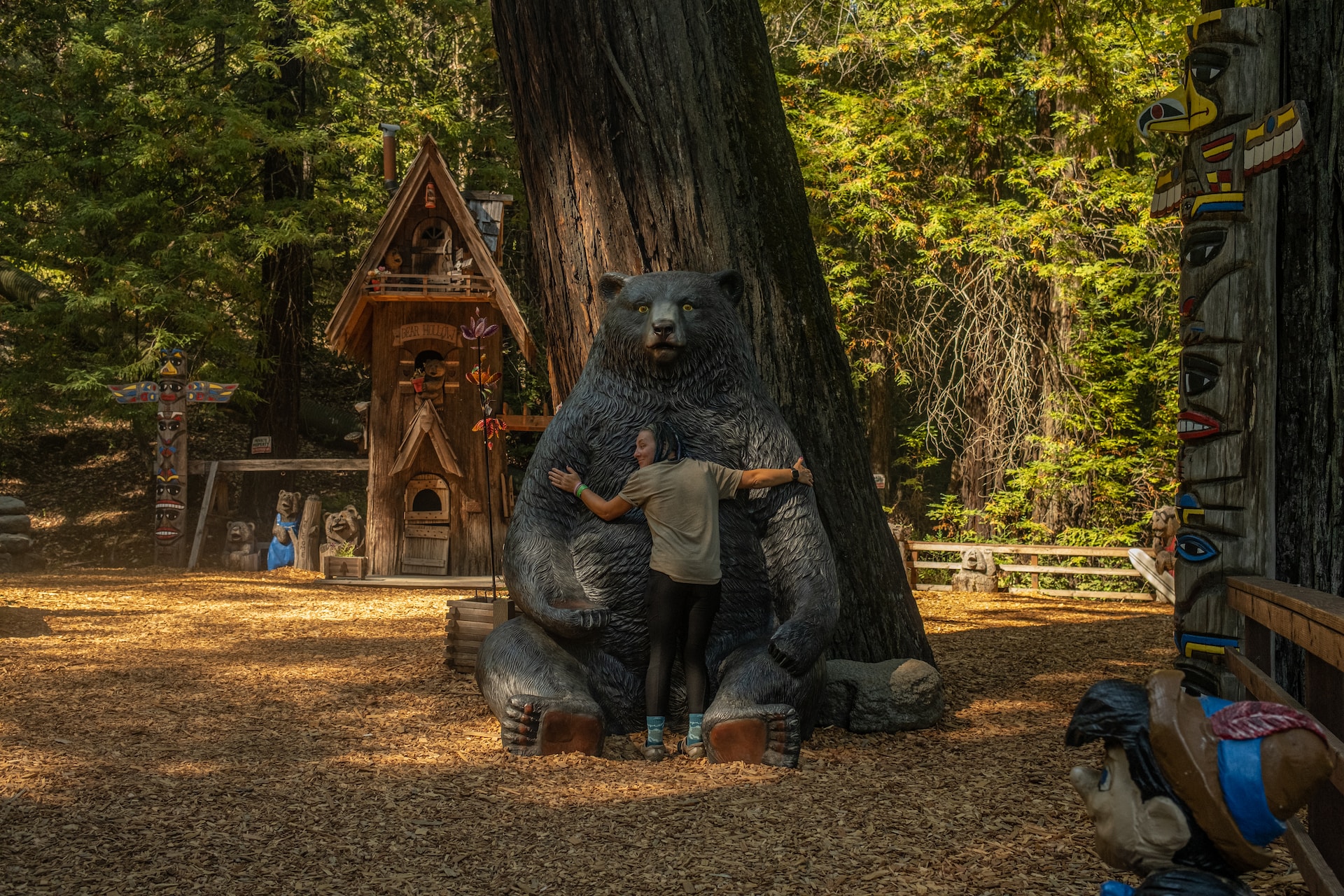by Jared Bier
They’re more scared of you than you are of them.
That was the typical response from just about anybody he asked: neighbors, folks at church, guys on the other crews. Any time he would broach the potential danger of working in such close proximity, they would all say the same thing: “They’re more scared of you than you are of them.” That, or something like, “They won’t bother you none”. To be fair, he would sometimes get the obligatory, “Just maintain a comfortable distance,” too, but even that seemed to be proffered more so as a suggestion than the warning he thought his inquiry warranted, and the unhurried Southern drawl with which these maxims were uttered somehow rendered their response all the more casual.
It was also, unsurprisingly, the unofficial company line. The grunts, the on-site project managers, even the twentysomething, freshly degreed engineers who would periodically drive out to the field for an in-person consultation would all say the same thing: “Yeah, but they’re more scared of you than you are of them.” They would look at the alligator, guesstimate its length, whistle if it was a particularly sizable specimen, say, “Nah, you’re good. They’re pretty skittish, you know,” then qualify their nonchalance with the predictable, “Probably more scared of you.” He wondered if anybody else on the job considered them an occupational hazard and whether or not an LLC could carry accidental death and dismemberment insurance. Or did a standard worker’s compensation policy provide for the injuries one might incur if attacked? What payout could he expect if one of those things were to, say, chomp his leg off?
Granted, if they were dragging people into the water and chewing them up left and right, any given attack probably would not arouse much attention. As it was, they occurred infrequently enough, and he supposed if he had lived near or amongst them his entire life, he too would have probably assumed that colloquial rationale, treating their presence with a dismissive brush-off and saying something like, “Just mind your own business and they’ll mind theirs,” or, “Well, they’re more of a nuisance than a threat.” But until recently, he had not lived near or amongst them, and a nuisance back home was just a raccoon that had burrowed in the soffits or a squirrel that had nibbled his unripened tomatoes. As such, anytime he pulled up to a jobsite and spotted one of the things creeping along the roadside or lurking at the water’s edge, he could not shrug off that lingering jitter of unease as he went about his work.
The one sprawled before him now, just a few feet into the water and a short lunge from where he had positioned his equipment along the embankment, looked to be one of those specimens of a particularly notable size. Apparently, one could fairly accurately ascertain the size of an alligator based on a cursory estimation of its snout, as the distance between the tip of its nose and its eyes represented some scale by which a general length could be approximated. He thought the method dubious, of course, but it was referred to authoritatively and almost as frequently as the assurance that they were more scared of him, so he chalked it up as another quirk, a folkway he could have appreciated and employed with comparable sincerity only if he had spent his entire life here. Besides, in only a few inches of water, more than just the head of this one was now showing, and he did not need to guess its size: lithe and sinuous, it was easily eight feet long.
He paused for a moment and stared down at it, not so much assessing the potential danger – he had encountered enough of them by now to know what minding his own business entailed – but contemplating its hideous, almost otherworldly countenance and physique. There was something so revoltingly exotic or undomestic about an alligator: the colorless eyes peering just above the surface of the water, the plated, scabrous backside, the long, limber tail draped over some jutting stones. Its constitution recalled those appalling medieval interpretations of devils, demons and other agents of the spiritual underworld that he had surveyed in his eschatological studies while in seminary. Actually, that indefinable mystique of this creature before him – this animal of prehistoric pedigree – undoubtedly informed those grotesquely reptilian depictions of centuries past. Even apart from its capacity to destroy him, he had difficulty believing that the sovereign Lord could speak something that looked so terrible into existence on the sixth day of creation and deem it “good”. What description was given of the leviathan in the Book of Job? “…Shall not one be cast down even at the sight of him?” Or how closely did this silent, ominously still creature before him resemble the dragon that haunted the apostle John’s Revelation? He shuddered, certain that his fear of it exceeded its fear of him.
No others appeared to be in the immediate vicinity at the moment. He scanned the banks and looked across the surface of the lake, but he only saw this one. Of course, the lake was probably infested with them: this was central Florida after all, and some of those individuals who laughed off his concern would also occasionally find them lounging in their backyard swimming pools. As new construction had proliferated northward and inland from the bay and the swamps continued to recede, the habitat of the state’s official reptile had modified increasingly: homeowners would occasionally report finding them in drainage ditches along the edge of neighborhoods, and he had seen them clustered about retention ponds alongside the interstate highway.
He began to unpack and assemble his equipment, periodically glancing at the alligator to ensure it had not determined that his presence demanded closer inspection. Though rare, most attacks, he knew, were unprovoked, and, while he had never actually witnessed this, he remembered reading in some past issue of National Geographic or Smithsonian that they could apparently cover quite a bit of ground with a quick, initial burst of speed. He proceeded to unfold his tripod, expecting each click and clack of the various mechanisms snapping into position to startle the animal from its repose.
As he kneeled down to procure a mounting bracket from his equipment bag, the coarse, granular churn of tires across the gravel driveway behind him stirred the encompassing quietude: he turned to see a pickup truck approaching. The truck slowed and pulled up lengthwise along the edge of the lake, and a man who looked to be a bit older than him, in his late sixties or early seventies, leaned across and addressed him from the open passenger seat window.
“What’s going up here?” the man asked in a tone that conveyed no interest in exchanging pleasantries. He could see, even under the shade of the cab, the man’s face and forearms were weathered and blotched, denoting the perpetual wear of the close Florida sun.
“Excuse me?”
“I’ve seen your signs along the road awhile now. And now I’m seeing trucks. You throwing up more condos or something?”
Entertaining the curiosity of passersby had become just as much a routine of these jobsite excursions as contending with the alligators. Locals – longtime residents, he imagined, and usually older codgers like this one – driving these county roads, after the firm’s signs had lined the property for some time, would note his logoed company car parked along the shoulder or just up the driveway and would divert for a brief look-see, inquiring what new residential metropolis or commercial monstrosity they could expect to see being built in the coming months.
“Well, I believe this is going to be a mix of homes and maybe some stores or restaurants,” he replied, hoping his smile and friendly demeanor might neutralize the man’s obvious displeasure. “I’m just surveying for the time being–”
“When are y’all starting to build?” the man snorted.
“Oh, I’m not sure about that. We’re probably still a ways off–”
“Geez,” the man grunted. “Always building something.” He shifted into drive and, then, more casually, almost genially, nodded toward the lake and said, “It don’t look like that gator’s going anywhere.” He then wheeled the truck back onto the long gravel driveway and drove away toward the road.
Always building something. It was a sentiment he had heard frequently echoed these last few years, and not just in similar passing exchanges. Most of his neighbors and the congregants at church were lifelong tenants of the county, and one of the recurring conversations seemed to concentrate on the next plot of land upon which an excavator would soon break ground. “Like we really need another Urgent Care” – accompanied with a shake of the head or a roll of the eyes – was a quip he had often heard repeated, as the last ten or fifteen years had seen the farmland and citrus orchards that comprised much of this region of the state yield to the relentless development of condominiums, pharmacies and walk-in clinics.
Having spent most of his nearly sixty years up north, where the urban sprawl of four major cities converged to form the loud, crowded Northeast megalopolis, he empathized with the old-timers who were feeling the strains of encroachment. After he and Kathleen decided to relocate down here, he had looked forward to what he assumed would be a respite from the bustle and swarm of the outer suburbs: initially, the area certainly seemed to offer a little bit of breathing space. Those visits, however, had apparently not afforded the long view, and now here he was, not only a licensed and registered resident of one of the fastest-growing regions of the country but also a salaried employee of a real estate development company partially responsible for facilitating that growth.
Stooping down once again for the total station, he checked on the alligator. It remained motionless, still nestled in the muck. He rummaged through another duffel bag for both the tablet computer that his firm had mandated all employees utilize in the field and the notebook containing his handwritten, step-by-step instructions regarding how to properly operate the tablet. When he had been doing this up north some twenty years ago across the Delaware Valley, before he answered the call to ministry and stepped away from the business, he had recorded coordinates and all pertinent observations in a notebook. Now, in a world of apps and data and “real time”, he felt like he was relearning the entire profession. “You know me: I’m a dinosaur,” was his self-deprecating go-to anytime he needed to endear himself to one of the younger engineers for a quick primer on the technology he now apparently needed to perform his job.
As he screwed the total station into the mounting bracket atop the tripod, he felt the buzz of his cell phone against his thigh. He took it out of his pocket and saw a text message from Glover, a church deacon and one of his accountability partners. “Can you talk? Just heard from Dylan,” the text read. He sighed, texted back, “I’ll call you in an hour,” then proceeded to set up the rest of his equipment. Every few minutes, between squinting through the total station and typing information into the tablet, he would habitually look down at the alligator. It still had not moved.
. . .
A few years ago he thought pastoring a small church just beyond the outer fringes of the Bible Belt would be – at least in regards to his day-to-day responsibilities – markedly easier than shepherding those who had comprised the congregation of his previous church back home. But this new ministry presented a transition much more difficult than he and Kathleen had anticipated when they moved down here: whereas before his primary challenge involved trying to jumpstart the indifference toward matters of God and spirituality that seemed generally pervasive throughout the regional Mid-Atlantic, here it seemed like he was constantly tending to the personal crises of a largely elderly church body. Furthermore, he had only served for six months or so before it became apparent that the finances of the church could not ultimately sustain a full-time senior pastor, so, after holding down several side jobs and shuffling logistics, he had returned to the secular line of work in which he had once been employed before earning his Master of Divinity and entering the ministry.
He had now been working full-time for the development firm and still pastoring the church for almost three years. His regular preaching on Sundays and his answering the seemingly constant telephone calls of his congregants on the other six days of the week earned him a small stipend from the church. And while sometimes he found himself scrolling through job listings, entertaining a passive hope that he might ride out the last few years before retirement elsewhere, and even though the congregation was consistently dwindling as the long-standing members died off or were relegated to the full-time care of one of the many nursing homes in the area, he knew he had been called to serve this particular people.
Leaning back against the headrest, he closed his eyes and stretched his arms out before him. The cool air conditioning swirled and swished over his neck and up the sleeves of his polo shirt. Despite the slight physical exertion that his work required, a few hours under the direct subtropical sun was draining, and, though he would never vocalize it, the prospect of Glover recounting his delinquent son’s most recent litany of transgressions was exasperating. Glover’s text message was only the first he had received from a church member so far this week, but he knew that, at least once or twice before next Sunday morning, he would rearrange his dinner plans with Kathleen and arrive home long after midnight after visiting the homes of several of his church members or the assisted living facilities and hospitals throughout the area where they were being cared for. However physically tired he felt at the end of the workday, consoling, counseling and sometimes reproving the members of his flock engendered a chronic, bone-deep weariness for which no course in seminary could have prepared him. “Come unto me, all ye that labour and are heavy laden, and I will give you rest” came to his mind then. He recited it silently, eyes still closed and arms still outstretched. He was thankful for such a truth, but – though he tried to suppress this feeling – at the moment it seemed too abstract, too palliative.
He picked up his phone and dialed Glover. It rang once before Glover picked up.
“Hey, Glover,” he said, trying to sound relaxed. He hoped to at least ease into the conversation.
“Pastor Judd,” Glover started, “Jeanette and I – we’ve just about – we’re at our wits’ ends. We–,” but he faltered.
The nickname irked him, even after all this time, but only Kathleen still called him Judson. A few of the folks at church began referring to him as Judd as soon as he arrived, and he had given up trying to correct them after a month or so. He distinctly remembered Glover especially forgoing the use of his proper name, guffawing when he introduced himself as Judson, “Well, that’s an Ivy League name if I’ve ever heard one.” He did not quite understand what Glover meant then, but after a few years here, he was becoming acquainted with the presumptions of his congregants: “Judd” imparted a persona that “Judson” evidently did not, and though he did not think he particularly lived up to the connotations of this nickname, these ailing, needy people wanted and apparently expected a Pastor Judd.
He waited out the rasping cacophony of Glover’s attempts to attain composure.
“Dylan called us last night,” Glover finally said. And then, sighing deeply, continued, “He’s back at it again.”
Another pause ensued. Glover was a talker, and Judson knew he did not need to reciprocate yet. Besides, as soon as he received Glover’s text message he had anticipated this conversation: it would be another iteration of that which Glover had been revisiting since they had met. Dylan, his late-twenty- or early-thirtysomething son, had gotten mixed up with drugs, attained some semblance of sobriety via steadfast emotional and/or financial support from Glover and Jeanette and/or licensed addiction counselors, and then had relapsed. Judson had listened to Glover and Jeanette discuss, question and cry over their son’s seemingly unremitting indiscretions at their home, at church, at the Waffle House. For Glover and Jeanette, this had been the suffering of their present time. Of course, per his responsibility as their pastor, their shepherd, so to speak, he had reminded them that those who mourn would be comforted.
“They’re going to find him in a ditch somewhere, Pastor Judd. We’re just waiting for that call. Honestly, at this point it just feels like a matter of time.”
“I’m sorry, Glover,” he offered. He hoped his condolence did not sound as tentative as it felt.
“It’s this new thing with him now. This opioid crap or whatever. A whole different beast. Nasty, nasty stuff,” Glover said bitterly, now in control of his emotions. “We thought it was bad when kids were just smoking dope or whatever, you know?”
Glover had shifted from the personal to the panoramic, and – though he felt like he was falling short of his pastoral obligation – this put Judson momentarily at ease. Decrying the ills of society was much easier than penetrating the destructive, self-indulgent tendencies of the nature of the individual; the ills of society could be answered with something like, “Men loved darkness rather than light, because their deeds were evil.” Sure, those who mourn would be comforted, but he could also not help but silently wonder if he could qualify the vague impracticality of that promise: those who mourn would be comforted how? When? In that future glory certainly, but what about here and now? The pain that Dylan had caused his parents here and now was fierce, and Judson – though ever wary of the consequence of blasphemy – perceived the limitations of the only comfort he could offer.
When he first began preparing for the ministry, some of the pastors with whom he had consorted amongst the tri-state evangelical circles back home – friends and mentors – advised Judson that the primary responsibility of the clergyman, aside from an unswerving commitment to preaching God’s infallible Word, of course, was a willingness to listen to his parishioners. Later, his professors at seminary – some of them intellectuals of a caliber that Judson had then only hoped to aspire – reiterated this. He recalled this now as he sat in his company car, shouldering his phone to his ear so that he could more handily swipe through his tablet to review his various measurements and rough sketches of the development site before returning to the office. Glover continued, fulminating against the illogic of drug abuse, moral decay and the “blacks, white trash and illegals” that he deemed responsible for the degradation. Judson knew he was somehow failing Glover, even if Glover was not conscious of the fact, but his availability afforded Glover the opportunity to ostensibly unburden himself, which in turn afforded Judson the opportunity to double-check his work.
“I don’t understand. I just don’t understand… We’ve been down this road so many times before,” Glover sighed. “He knows, Pastor. Dylan knows what he’s doing to himself. He knows what he’s doing to Jeanette and me.”
As Glover circulated back to his son’s addiction, Judson felt that familiar ambivalence: he had no shortage of inspiration to dispense, but he was not certain whether he could articulate exactly how it might soften the immediacy of this real-life tragedy. He tossed the tablet onto the back seat of the car, and, because he was no longer sure of what to say or how to say it, offered, “Glover, I’m so sorry. You know Kath and I have been praying for you guys.”
“Could we meet, Pastor? We’re hurting.”
“Absolutely. We’ll sit down and take this thing to the Lord together. Me, you and Jeanette.” And then, because he thought he should, he added, “And Dylan.”
Glover breathed another world-weary sigh into the receiver. “He’s been on and off the last few days. Haven’t heard from him since the night before last… Jeanette went over to his place this morning,” and Judson heard him gruffly choke back another sob, “His truck wasn’t there.”
A silence ensued, and Judson once again waited until Glover could continue. “I’m this close to telling him not to call again, that we’re done helping him… You know how badly that makes me feel? That I actually don’t want to keep hearing from him?”
Throughout the conversation, Judson had been minding the clock on his center console. He needed to get back to the office. When Glover paused again, he spoke up: “Hey, Glover, I’m going to put you on speaker,” and then, awkwardly, regrettably, added, “I’m actually in the car.”
Glover sighed. “That’s alright. You’ve got things to do. I’m just… I don’t know what to do, Judd. My boy needs help.”
“Well, your boy needs prayer,” Judson replied. He hoped he did not sound too eager to end the conversation.
Before he pulled out onto the road, he eyed the alligator one last time through his rearview mirror. Still it retained its posture, slunk partially in the sediment, the various contours of its head and backside and tail visible above the waterline. Within the next several months, the foundation of one enterprise or another would be laid along the banks of the lake, and he wondered, with this inevitable and abrupt flurry of activity, if the alligator would continue to reside there. Actually, why would it not? He remembered the surprise he felt when he first saw the warnings posted along the Riverwalk in downtown Tampa: he did not suppose that portion of the Hillsborough was regularly overrun by the creatures, but the fact that the city felt the need to place the signs amidst its modern high-rise buildings was telling. The alligator – from its fearful corporeality to its tenacious proliferation – evoked the primeval barbarity of those first chapters of Genesis. He wondered if there was an object lesson to be derived from the specie’s abiding resilience and whether or not he could somehow incorporate it into a sermon in the near future. At the very least, he thought with a twinge of guilt, it might kill a good ten minutes or so of the time that he was expected to fill at the pulpit.
. . .
Burnout had always been a concern. Judson had been warned of it by those from whom he sought counsel when he first entered the ministry, and his previous church up north – a megachurch by definition and certainly in comparison to the eighty or ninety regular attendees he oversaw presently – had even granted periodic sabbaticals as a preemptive caution to members of its pastoral staff. At various points over the years, he had certainly felt overextended, but, fundamentally, to minister was to serve; he had always found that reassurance sufficiently invigorating. Lately, however, the demands felt inexorable, such that his “service” had been reduced to a frantic, day-to-day whack-a-mole. A text message here, a telephone call there: some pressing need would inevitably require his attention.
In his previous ministry, when somebody was admitted to the hospital or consigned to hospice, the visitation pastor was informed; when somebody could not pay their mortgage, one of the many church committees stepped in; when a grieving father wanted to talk about his son’s drug addiction, Judson just referred him to the professional counselor on staff. In hindsight, he may have never actually been called upon to exercise that supposed responsibility he had to listen to his parishioners there.
As stressful as that first year in Florida had been, having uprooted from the familiar Northeast and then tending to the inordinately demanding responsibilities of this little church all while carrying out an unexpected job search, his nine-to-five work – at least when he was out by himself, when he was not struggling to learn some new software – actually provided a reprieve. Land surveying, technical in nature, was simple, straightforward; the process required both rote procedure and a very specific application of knowledge and skill that he had acquired long ago. Angles and distances were not fickle; the terrain – his raw material, so to speak – availed itself to his purposes without demand and without resistance. Such was not the case with the fragile, volatile hearts of the faithful. And surveying at least bore some practical relevance as well: he had studied for this work, albeit toward the undergraduate degree he earned long ago, and the education he had attained was at least useful. On the other hand, he could not remember when he last delivered a sermon that exegeted a divisive passage of Scripture or explicated some actual doctrine, responsibilities for which seminary had supposedly prepared him. He was Pastor Judd now, and Pastor Judd, per these people who had christened him as such, shook hands and hugged and prayed and offered heartening words.
Sometimes, especially in light of the quantifiable progress his day job effectuated, he could not help but wonder whether he was adequately equipped to minister in the first place. That distinctly Millennial brand of feel-good spirituality had previously relegated him to a cog in a well-oiled system, whereas here he was the system, and neither scenario accommodated those convictions that had initially informed his understanding of what it meant to shepherd a people. “I am made all things to all men” – which he had at first relied upon as a motivator, almost a mantra of sorts – had recently assumed an entirely new meaning that he was not sure he felt like embracing.
. . .
He had been avoiding Earl for a few weeks now, and Judson knew that he owed him a definitive reply. Besides, if he did not eventually cross paths with him via some mutual acquaintance in their evangelical network, he would likely run into him at the next church association conference. Judson had endured Earl’s sales pitch at the previous meetup, and Earl persisted now, leaving a voicemail for Judson every other week or so. When his screen lit up later that afternoon with the familiar number, he answered it, hoping he could successfully and permanently deter Earl’s spiel.
“Pastor Judd! Looks like I finally caught ya.”
The nickname had somehow prevailed even at the conference, an event held upstate annually. Since his move to Florida, he had attended as the sole representative of his church and consciously introduced himself as Judson to the other pastors and vendors with whom he would eat lunch, talk shop and pray over the course of the weekend. Still, these peers – like his parishioners – apparently presumed a degree of comfort in their relation to him, and by the end of the conference each year he was answering to Judd.
“Hi, Earl. I’m sorry I haven’t–”
“How ya been?”
“Well, not too bad. I do need to apologize–”
“You thought anymore about our conversation, Pastor?”
While he saw many of the same faces year to year, Judson had sustained casual friendships with only a few of the other regular attendees; his interactions with most of the others were usually limited to reintroductions and small talk. He had only met Earl for the first time at this most recent conference, but Earl was memorable: he was imposing, both in stature and mannerism, and exuded a flamboyance from which Judson naturally recoiled. Per the unsolicited bio he offered when they first met, Earl had for some years traversed the South, hosting tent revivals and propagating until, in his words, the Lord directed him toward a new ministry, a new and evidently pressing means of “equipping the saints”. He was a brash, self-described go-getter, with respect to, formerly, the souls of the lost – Judson had no difficulty imagining Earl thumping a podium, bastardizing in his unsophisticated fashion the constitutional principles of hamartiology and soteriology before a gathered crowd – and now the welfare of the church.
“Well, Earl, I think we’re going to have to pass.” Judson tried to sound resolved, but then added hastily, “For now.”
“Well, wait a minute. Let me ask you, Pastor: have you thought about it?”
“Yeah, you know, I just don’t think–”
“Judd, hear me out now. You pray – we pray for a so-called hedge of protection, right? Well, this may just be an opportunity to ensure ours is a little tighter, a little stronger. These are some dark times we’re in. And the Lord certainly helps those who help themselves, right? Now I know I don’t need to tell you that.”
“I’m just not sure I – I’m not sure the church sees the need for it at the moment, Earl. We’re a – by and large, we’ve got a pretty established group of folks here; I’m not sure they’d take so much to the idea–”
“Well, that’s all the more reason!” Earl countered with a good-natured laugh. “Judd, let me tell ya: us longtimers are the ones who ought to see it comin’. We’ve seen the way things are headed: the world’s a scary place nowadays. A godless nation, am I right?”
In truth, Earl’s proposition – replete with the aphoristic Christianese and improvised moralizing he had employed upon their first encounter – would have mustered the fervor of Judson’s congregants with distressingly predictable effect. His preservationist rhetoric and repertoire of platitudes recalled the insularity that seemed to inform their collective concerns, and aggressive appeals for metaphorical last stands always seemed to go over well amongst these folks. Purportedly, Earl was selling peace of mind, but his impassioned calls for resistance and self-preservation would have no doubt gratified their predisposition toward dominion theology and engaged their penchant for assuming their supposed role as a bastion of virtue in the face of a degenerating culture.
As he listened to Earl expound upon the alleged infiltration of “the Moslems” and other portents of “a coming hardship”, Judson recalled the business card Earl had insisted he take upon their first encounter: a cutout of Earl from the waist up, clad in a gray dress suit and muted necktie, superimposed against a bright backdrop of American stars and stripes. In the photograph, Earl was clutching a Bible close to his chest and pointing a handgun at the camera. Above his contact information, the phrase “We are troubled on every side, yet not distressed… Persecuted, but not forsaken” was emblazoned in yellow script typeface. Judson had originally pocketed it, thinking Kathleen might appreciate hearing about “one of the characters” he had met at the conference, but after another run-in or two with Earl that same weekend, Judson had thrown it away.
“Earl, can I ask you – how many other churches have you worked with?”
“Judd, it’s amazing watching the Lord work. Just last week I was up in Tennessee. And I’ve got another consultation next month not too far from where you are. That’s actually why I was calling: hoping I could swing by and sit down with you,” Earl replied. “We’re really taking off. The Lord is blessing us, Judd. Really blessing us.”
“Well, I’m going to have to run your ideas past my deacons. I’m not sure we’re in the position at this point to be spending much–”
“Hey, I understand your obligation to stewardship, Pastor. I’m a minister myself, remember? But you can’t be too careful these days.” Then, his voice slowing and dropping in volume, Earl proceeded: “I think – I really do think that whole thing out there with those folks in Texas speaks to the need for this. Most churches nowadays are just – we’re just sitting ducks.”
This invocation of recent tragedy elicited from Judson a sigh more audible than he intended. The reference, which followed Earl’s mongering and paranoiac business strategy expectedly, discomfited him: had Earl or he or his congregants not had reason to feel wary before psychotic gunmen semi-occasionally marched into public buildings and schools and now houses of worship and opened fire? Was this phenomenon really a sign of some crumbling societal basis of morality? Or was it just another relatively newer, more consequential take on that dynamic which had always imbued mankind’s interactions? Had not, upon surveying his own work only some generations after creation’s first predawn, “it repented the Lord that he had made man on the earth”? From Judson’s standpoint, that which Earl offered protection from was not as unfamiliar or disconcerting as was the assumption that inspired it.
In any case, Judson could not imagine carrying a gun on his person while preaching from the front of the auditorium, much less feeling comfortable knowing several of his congregants were packing heat as they sat in the pews listening to him. He himself had never even held a gun, and, of his regular attendees, Judson would be hard-pressed to identify more than a dozen or so who were mobile enough without the aid of a walker or were not accompanied to the church services by a professional caregiver. He mentioned this to Earl as tactfully as he could, hoping the fact would speak for itself: in short, this was not a people from which an armed “church guard” could be effectively and judiciously raised, regardless of any training Earl claimed to offer.
“Well, hey, let me come down there, and they can hear me out themselves. I wouldn’t even need the morning worship service. Just give me a Sunday evening, I’ll run through my ideas, and we can take it from there.”
“Earl, I appreciate it,” Judson replied. “And I’ll keep you in mind for the future. I think we have to pass at this point though.”
“Alright, Judd,” Earl conceded, though his tone suggested that Judson would not be the one initiating a follow-up. “But I wouldn’t want to let this go if I were you.” Then, almost as an afterthought, he added, “It’s a whole new world we’re living in, Pastor. Things are falling apart out there.”
. . .
Before he saw it in the middle of the road, before the untoward shape and size of it instantaneously reoriented and jolted him awake, before he was able to swerve onto the shoulder and careen into the ditch running alongside the highway, Judson had been listening to Glover talk about invasive species.
After work, he had picked up Glover and set out with him on the long drive up to Jacksonville where Glover would be overseeing Dylan’s check-in at another rehabilitation center. Judson had already been out a few nights earlier that week fulfilling some pastoral duty or other, but when Glover had requested that he accompany him, Judson of course obliged. “Jeanette is… She’s not ready to see him yet,” Glover confided, so Judson figured his company, if anything, would provide some semblance of moral support. And, selfishly, he also hoped that the ample time they would have in the car together would afford the opportunity to talk and offer the counsel he had promised in their previous conversation: spending almost three hours in the car with Glover both there and back would certainly mean not having to meet with him on another weeknight in the near future.
As he drove northeast across the state under the crisp, lengthening tint of the setting sun, Judson felt the onset of an inexorable fatigue. The workweek had been demanding and his parishioners had been needy, and the task of traversing so many miles of interstate before him – now awash in the sunlight’s placid, copper sheen – seemed insurmountably difficult. The further he drove, the more he settled into his repose, and with drowsy complacency he was soon shifting lanes less frequently and asking intermittently fewer follow-up questions to redirect Glover’s monotone ramble back to Dylan. In those waning moments of lucidity, Judson struggled to repress his resentment: resentment of Glover’s incessant talk, resentment of Glover’s abject helplessness, resentment of Glover’s obvious shortcomings as a father, resentment of Glover’s inability to drive himself anymore. He allowed himself to lean back against the headrest, but this only further impaired his concentration.
“It’s these illegals mostly: Latinos and Mexicans. They’ve got something for exotic pets, I hear,” Glover grunted. “Imagine wanting one of those things in your house. If I could drive anymore, I might consider heading down there and hunting me a python myself.”
Judson nodded.
“Kills me that my tax dollars are paying for getting rid of something that never would’ve been here if the folks that brought ‘em weren’t here in the first place,” Glover continued.
Judson yawned.
“What do they think they’re going to do with one of those things when it gets too long to handle? Then they just go dump ‘em in the swamps and let somebody else bear the repercussion. Folks just coming in, doing what they want.”
Judson sighed.
“I tell ya, Judd: things aren’t what they were.”
Later, as he watched his car being towed away and waited for Kathleen to pick up her phone, he wondered how much time had elapsed between the moment his eyes shut and the instant he glimpsed the alligator in the middle of the road before him. Five seconds? Thirty seconds? A full minute? Had Glover seen it and alerted him? The thing was massive: from snout to tail, it fully spanned his lane and several feet of the one adjacent. Even in the split second that he managed to veer away from it, Judson had been able to see and process that.
“Lucky you missed it,” the state trooper said. “Would’ve done way more damage to you and your buddy. Especially if it was as big as you think it might’ve been.”
Shortly after Judson crawled out of the car and shakily dialed 9-1-1, an ambulance had arrived: Glover did not appear to have sustained any injuries, but the responders suggested he undergo a precautionary evaluation. Judson told Glover he would get over to the hospital as soon as Kathleen picked him up.
He scanned the reeds growing at the edge of the gully along the roadside, but in the fading light he could not detect any indication of the alligator. The sheer fact that it was somewhere in there – with others, certainly – was unsettling. He shuffled a few feet further onto the asphalt.
An inky blue twilight had all but subsumed the day. Another car whizzed by, and the breeze of its passing rushed past Judson and through the grass behind him. The night was quiet now but for the tinny buzz of some lights mounted along a billboard just up the road. For the first time he noticed the subject of its advertising: glowing above him was an artist’s rendition of another development that his own firm would soon be cobbling together. “COMING SOON!” it raved. Under the lurid, fluorescent glow, he saw the vapor of his breath curl into the darkening sky: the dwindling sunlight had ceded to an atypical evening chill, which somehow unnerved him further. He glanced over his shoulder, half-expecting the alligator to be slinking up behind him.
The trooper noticed Judson’s unease. “That thing is long gone,” he chuckled. “I can’t believe it was out here in the first place.”
“No?” Judson asked. After all, there was little traffic this evening. Plus, Judson saw alligators everywhere he went: some of them must occasionally make their way out to the highway.
“You don’t usually see gators out here. And it’s sure not coming back this way again,” the trooper said, authoritatively, dismissively. “You know what they say.”
Just as the final gleam of sunlight disappeared behind the road from where he had come, the insects about him commenced in a rich, ambient hum, drowning out the metallic ring of the lights above. He tried to imagine these surroundings as they existed some eons prior to whichever people group staked its first presumptuous claim: miles and miles of slight, achingly verdant hills dappled with lakes, each one teeming with its own impeccably crafted ecosystem. The cicadas would have been performing their same song under a firmament almost as black as those first three nights of creation.
Just then, the unmistakable, guttural call of an alligator prowling somewhere beyond the grasses recalled him to the present.
“They’re more scared of me?” Judson confirmed.
The trooper shrugged. “That’s what they say.”
Jared Bier is a high school English and language arts teacher. He enjoys reading, writing, and traveling with his wife and four young sons.














